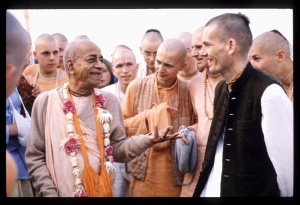SB 4.13.43: Difference between revisions
m (1 revision(s)) |
(Vanibot #0054 edit - transform synonyms into clickable links, which search similar occurrences) |
||
| (One intermediate revision by one other user not shown) | |||
| Line 1: | Line 1: | ||
{{info | {{info | ||
|speaker=King | |speaker=King Aṅga | ||
|listener=King | |listener=King Aṅga thinking to himself | ||
}} | }} | ||
[[Category:Srimad-Bhagavatam - Canto 04 Chapter 13]] | |||
[[Category:Bhagavatam Verses Spoken by Anga Maharaja - Vanisource|041343]] | |||
<div style="float:left">'''[[Srimad-Bhagavatam]] - [[SB 4|Fourth Canto]] - [[SB 4.13: Description of the Descendants of Dhruva Maharaja|Chapter 13: Description of the Descendants of Dhruva Mahārāja]]'''</div> | |||
<div style="float:right">[[File:Go-previous.png|link=SB 4.13.42]] '''[[SB 4.13.42]] - [[SB 4.13.44]]''' [[File:Go-next.png|link=SB 4.13.44]]</div> | |||
{{RandomImage}} | |||
==== TEXT 43 ==== | ==== TEXT 43 ==== | ||
<div | <div class="verse"> | ||
prāyeṇābhyarcito devo | :prāyeṇābhyarcito devo | ||
ye 'prajā gṛha-medhinaḥ | :ye 'prajā gṛha-medhinaḥ | ||
kad-apatya-bhṛtaṁ duḥkhaṁ | :kad-apatya-bhṛtaṁ duḥkhaṁ | ||
ye na vindanti durbharam | :ye na vindanti durbharam | ||
</div> | </div> | ||
| Line 16: | Line 22: | ||
==== SYNONYMS ==== | ==== SYNONYMS ==== | ||
<div | <div class="synonyms"> | ||
''[//vanipedia.org/wiki/Special:VaniSearch?s=prāyeṇa&tab=syno_o&ds=1 prāyeṇa]'' — probably; ''[//vanipedia.org/wiki/Special:VaniSearch?s=abhyarcitaḥ&tab=syno_o&ds=1 abhyarcitaḥ]'' — was worshiped; ''[//vanipedia.org/wiki/Special:VaniSearch?s=devaḥ&tab=syno_o&ds=1 devaḥ]'' — the Lord; ''[//vanipedia.org/wiki/Special:VaniSearch?s=ye&tab=syno_o&ds=1 ye]'' — they who; ''[//vanipedia.org/wiki/Special:VaniSearch?s=aprajāḥ&tab=syno_o&ds=1 aprajāḥ]'' — without a son; ''[//vanipedia.org/wiki/Special:VaniSearch?s=gṛha&tab=syno_o&ds=1 gṛha]-[//vanipedia.org/wiki/Special:VaniSearch?s=medhinaḥ&tab=syno_o&ds=1 medhinaḥ]'' — persons living at home; ''[//vanipedia.org/wiki/Special:VaniSearch?s=kad&tab=syno_o&ds=1 kad]-[//vanipedia.org/wiki/Special:VaniSearch?s=apatya&tab=syno_o&ds=1 apatya]'' — by a bad son; ''[//vanipedia.org/wiki/Special:VaniSearch?s=bhṛtam&tab=syno_o&ds=1 bhṛtam]'' — caused; ''[//vanipedia.org/wiki/Special:VaniSearch?s=duḥkham&tab=syno_o&ds=1 duḥkham]'' — unhappiness; ''[//vanipedia.org/wiki/Special:VaniSearch?s=ye&tab=syno_o&ds=1 ye]'' — they who; ''[//vanipedia.org/wiki/Special:VaniSearch?s=na&tab=syno_o&ds=1 na]'' — not; ''[//vanipedia.org/wiki/Special:VaniSearch?s=vindanti&tab=syno_o&ds=1 vindanti]'' — suffer; ''[//vanipedia.org/wiki/Special:VaniSearch?s=durbharam&tab=syno_o&ds=1 durbharam]'' — unbearable. | |||
</div> | </div> | ||
| Line 23: | Line 29: | ||
==== TRANSLATION ==== | ==== TRANSLATION ==== | ||
<div | <div class="translation"> | ||
The King thought to himself: Persons who have no son are certainly fortunate. They must have worshiped the Lord in their previous lives so that they would not have to suffer the unbearable unhappiness caused by a bad son. | The King thought to himself: Persons who have no son are certainly fortunate. They must have worshiped the Lord in their previous lives so that they would not have to suffer the unbearable unhappiness caused by a bad son. | ||
</div> | </div> | ||
__NOTOC__ | |||
<div style="float:right; clear:both;">[[File:Go-previous.png|link=SB 4.13.42]] '''[[SB 4.13.42]] - [[SB 4.13.44]]''' [[File:Go-next.png|link=SB 4.13.44]]</div> | |||
__NOTOC__ | |||
__NOEDITSECTION__ | |||
Latest revision as of 21:23, 18 February 2024

His Divine Grace
A.C. Bhaktivedanta Swami Prabhupada
A.C. Bhaktivedanta Swami Prabhupada
TEXT 43
- prāyeṇābhyarcito devo
- ye 'prajā gṛha-medhinaḥ
- kad-apatya-bhṛtaṁ duḥkhaṁ
- ye na vindanti durbharam
SYNONYMS
prāyeṇa — probably; abhyarcitaḥ — was worshiped; devaḥ — the Lord; ye — they who; aprajāḥ — without a son; gṛha-medhinaḥ — persons living at home; kad-apatya — by a bad son; bhṛtam — caused; duḥkham — unhappiness; ye — they who; na — not; vindanti — suffer; durbharam — unbearable.
TRANSLATION
The King thought to himself: Persons who have no son are certainly fortunate. They must have worshiped the Lord in their previous lives so that they would not have to suffer the unbearable unhappiness caused by a bad son.